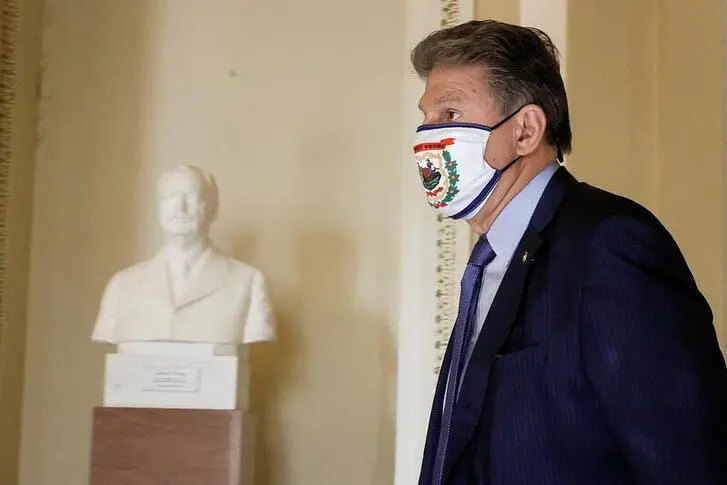PHOTO
(The author is a Reuters Breakingviews columnist. The opinions expressed are her own.)
WASHINGTON - The health of the planet hangs somewhere over West Virginia. Joe Manchin, one of the coal state’s senators, is in line to cast the deciding vote on President Joe Biden’s $1.8 trillion “Build Back Better” spending plan. He’ll indirectly be voting on Biden’s ability to influence other countries to fight climate change after the COP26 summit.
Biden has faced two main challenges to his spending plan, a companion to the $1 trillion infrastructure legislation Congress approved on Friday. One objection comes from lawmakers worried about the amount of money at stake. After an earlier compromise, climate change initiatives are the biggest chunk of the overall blueprint at $555 billion, more than half of which comes from tax credits for cleaner vehicles and manufacturing. Manchin is already a self-confessed budget worrier.
The other obstacle is unease around specific climate initiatives. Manchin hails from a state with less than 2 million residents, but a heavy reliance on coal. His disapproval helped squash Biden’s proposal for a Clean Electricity Performance Program that would have incentivized utilities to stop using oil, coal and gas. The goal was for 80% of electricity produced in the country to come from clean sources by 2030, compared to the current 40%.
Green-energy tax credits are still on the table and offer a bigger bang for the taxpayer’s buck than the clean electricity program, think tank Resources for the Future estimates. By 2030 they would get the United States to 69% of its electricity coming from clean sources.
Manchin has good reason to keep those tax credits alive. While West Virginia is the second-largest coal producer in the United States and top five in natural gas, according to the U.S. Energy Information Administration, it’s also one of the states most exposed to damage from climate change. More than 60% of its power stations are at risk from a so-called 100-year flood, according to the First Street Foundation.
The senator’s decision will have global repercussions. China, India and other countries are only likely to listen to Biden’s pleas to help fight climate change if he looks able to meet such pledges himself. For example, the president wants other countries to help cut methane emissions by 30% this decade, but would still need Manchin’s support to levy fines on U.S. methane-leakers, which is far from guaranteed. For such a small population, West Virginia has a huge responsibility.
CONTEXT NEWS
- U.S. President Joe Biden on Nov. 6 urged Congress to pass his Build Back Better plan, a package of around $1.8 trillion in spending on social and environmental programs. The spending initiative has already been cut in half during the process of negotiations.
- Biden had hoped to have the plan passed before he arrived on Nov. 1 at the 26th Conference of the Parties to the U.N. Framework Convention on Climate Change (COP26). Supportive lawmakers hope to vote on the plan before the Thanksgiving holiday on Nov. 25.
- Separately, the U.S. House of Representatives on Nov. 5 passed a roughly $1 trillion infrastructure plan to improve roads, bridges and broadband access. The legislation was already passed by the Senate.
(The author is a Reuters Breakingviews columnist. The opinions expressed are her own.)
(Editing by John Foley and Amanda Gomez) ((For previous columns by the author, Reuters customers can click on CHON/ SIGN UP FOR BREAKINGVIEWS EMAIL ALERTS https://bit.ly/BVsubscribe | gina.chon@thomsonreuters.com; Reuters Messaging: gina.chon.thomsonreuters.com@reuters.net))





















